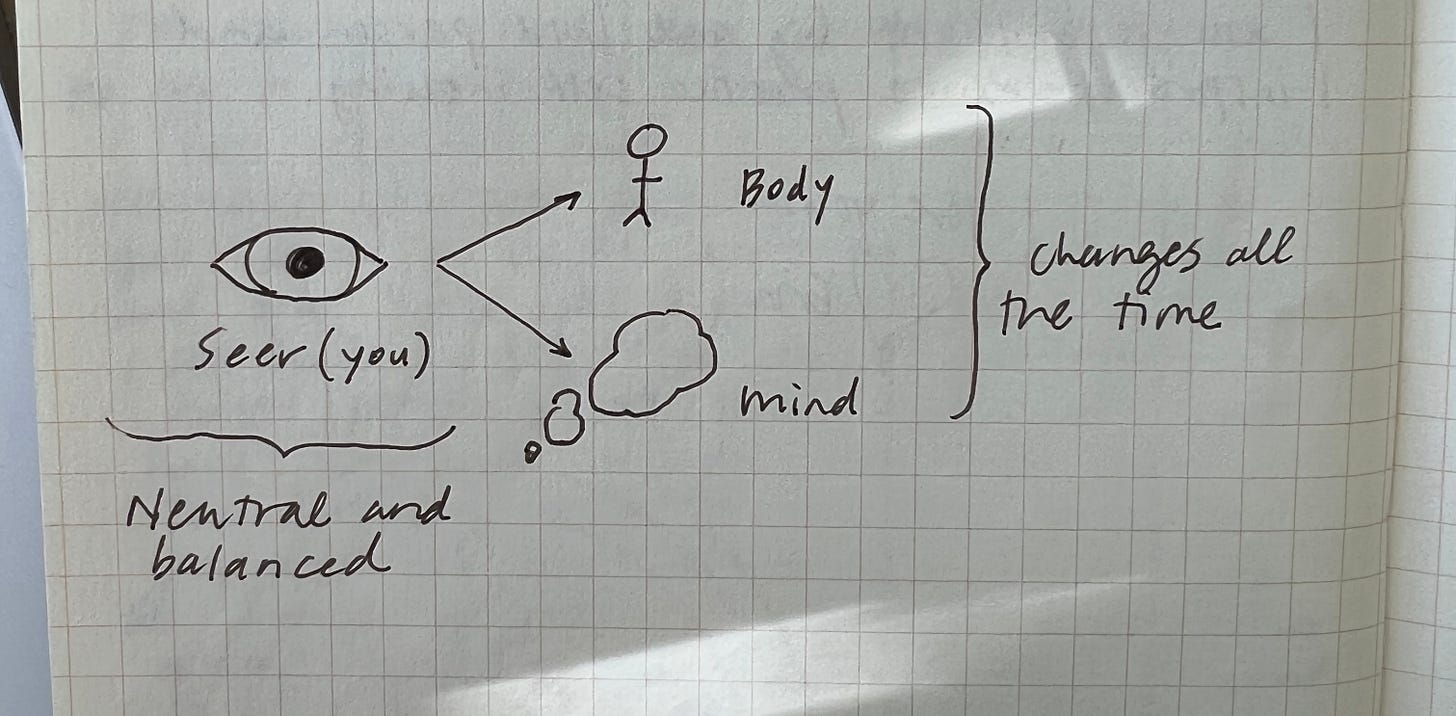WORKWORK15: You are Not Your Body or Your Mind // Future Commerce’s 2022 Visions Report
Inner Work: You are not your body or your mind. Practicing being a 3rd party observer of your thoughts. Outer Work: Future Commerce’s 2022 Visions Report
Inner Work
Much of the last few WORKWORK’s had to do with questioning our thoughts and analyzing them so that we can think of something that is more useful, more loving, and truer. Sometimes I can find the process overwhelming, (the majority of the time I love it) it can be a full-time job to monitor all the things passing through this brain of mine, creating who I am that day.
Recently, I decided to revisit and study the yoga sutras, which are essentially the guiding principles of yoga and came across a concept that gave me a sense of relief. The third yoga sutra says:
You are the true Seer. You are not the body nor the mind. You always see your mind and body acting in front of you. You know that the mind creates thoughts, but you are not involved in it. Our body changes all the time, but it is not us. Our mind changes all the time, but it is not us. The Seer is always neutral and balanced.
Below is what I drew in my notes to help me visualize this concept.
This concept gave me a sense of power and a slight lack of ownership at the same time. To me, it says, “Relax, Erin, don’t take your thoughts so seriously. They aren’t actually you. You are just the observer, and you have the power to determine how you want to see yourself.”
So why do we feel like the mind and the body is us? Reflections. Let me explain. When we see our body reflected back to us in the mirror, we trust that that is actually our body. But if the mirror is skewed or distorted, we see our body as skewed or distorted. As a personal anecdote, when I was younger, I definitely preferred mirrors that made me look less tall and lanky and I had friends who preferred mirrors that made them look longer and leaner. You’d be surprised by the subtle nuance you can find in Bed Bath and Beyond full-length mirrors 😂. The point is that it’s not actually our body it's just a reflection dependent on the changing mirror.
Now replace your body with the Seer and the mirror with your mind. Your mind is the reflection of the Seer, but it is not the Seer. The mind reflects back to the Seer and sometimes we feel like our thoughts are actually us, but they are not. In the same way that a mirror can distort the reflection of your body, our mind can distort the reflection of who we are. Our mind might say today, I am dumb, and we think we are dumb. It might say, I am brilliant, and we think we are brilliant. You can choose which of those thoughts you want to be your reflection. Some days it might be really hard to get the thought “I am dumb” out of your mind but at least you can start to disassociate a bit with it and say, I might be thinking this today, but soon that will change, and I will think differently. Here’s another drawing that might help solidify this concept visually.
I encourage you to practice the process of watching your thoughts today as a third-party observer, almost as if they are someone else’s, and see how it feels :)
Outer Work
I’m excited to share that I have determined a new format for Outer Work. For each entry, I will share a useful resource and provide some key highlights, notes, or takeaways from it. The first is Future Commerce’s 2022 Visions Report. I’ve always admired the content that Future Commerce puts out. It’s always strategic, and informative and truly reaches the breadth that “commerce” as a whole encapsulates. Their 2022 Visions Report is a creative and insightful look into the future of commerce. Here are some key highlights and my thoughts in italic :)
“Maybe I’m happy being a sneakerhead. Maybe. Or maybe [the algorithm] is the reason that I desire anything nowadays.”
Are we really making our own decisions or are algos?
Hawthorne effect occurs when people behave differently because they know they are being watched.
What effect does that have on how creators behave and in turn how we compare/measure our life?
Keeping up with the Joneses and conspicuous consumption.
In a world where we compare ourselves to others on social and where the competition to stand out continues to set the bar high in business, it’s interesting to think about how seeing others win could lead you to lose just by way of how you view their success. In short, you might be more likely to lose if you are too worried about them.
“Creating new gods to please. How very human of us.”
As someone who was raised in a very traditional Catholic household, I can’t help but feel slightly triggered by the section dedicated to the above. So, no comment, but definitely worth reading.
China’s Generation F (Focus)
As you make more money, you become more distracted because you increase the number of streams of income you have. While it’s sad to think about the focus being mandated upon people, it’s definitely interesting to think about how you can find more levers to build focus-inducing habits.





